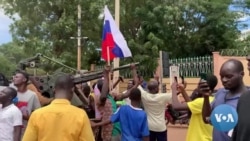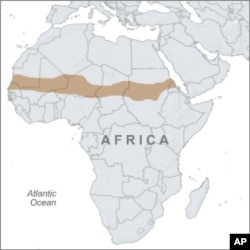Countries in Africa’s Western Sahel region — including Burkina Faso, Mali and Niger — saw a 50% increase in deaths due to conflict in 2022. That’s according to figures from the Armed Location and Event Data Project. As violence has spread, so too has Russia’s influence and political instability, with increasing coups and numbers of displaced people.
As the Western Sahel conflict entered its 11th year, starting from Mali’s 2012 coup, violence grew worse. Data from the Armed Conflict Location and Event Data Project show around 9,000 fatalities due to conflict in 2022, up from about 6,000 the year before.
Analysts say many in the Sahel countries are exhausted by the worsening conflict and they are looking to new international partners for solutions.
Some in the region, like Bachirou Ouedraogo, a painter and decorator in Burkina Faso, believe Russia will remedy Burkina Faso’s insecurity.
Burkina Faso has been partnered with France for years, he said. If France really wanted to help the country with terrorism, he said, they would have done it long ago. “If you partner with someone who doesn’t help you take care of business, you have to get rid of them and find someone who can,” he added. “That’s why Burkina Faso thinks they must pivot to Russia.”
2022 saw France wrap up Operation Barkhane, its military intervention based in Mali, as it became increasingly unpopular and relations with Mali’s military junta began to deteriorate.
France is now moving much of its military operation in the Sahel to Niger.
In Mali, French troops have been replaced by mercenaries from a Russian paramilitary organization, the Wagner Group, which has been accused of human rights abuses and of fueling more violence than they prevent.
In Burkina Faso, pro-Russian and anti-French protests and attacks on French-owned institutions and businesses have become commonplace since a second military coup in a year took place in September.
Both the Malian and Burkinabe juntas cited the previous government’s inability to solve the insecurity.
Asked how the Sahel’s conflict could develop in 2023, analyst Michael Shurkin of 14 North Strategies told VOA, “What remains to be seen is what happens as the population of Mali figures out that things are getting worse despite everything. Burkina Faso, I worry a great deal about. I think given the scale of the problem in Burkina Faso, I think they need a lot more international help. I’d like to see the U.S. government getting more involved to help the Burkinabe government.”
Analysts have also noted that an increasing number of terror attacks are taking place in the northern regions of Ivory Coast, Ghana, Togo and Benin along the borders with Burkina Faso and Niger.
Press freedom has dwindled, according to advocacy groups, with international broadcasters and journalists being banned from Burkina Faso and Mali.
Meanwhile, local rights groups and press freedom advocates say human rights continue to suffer too.
Daouda Diallo runs a Burkinabe rights group, the Collective Against Impunity and Stigmatization of Communities.
“It must be said very clearly that since January to the present day… we’ve noted great sadness and bitterness as the security situation has continued to deteriorate,” he said. Running parallel to this deterioration of the security situation, he said, are human rights violations.
In Burkina Faso, the new junta says it is recruiting 30,000 extra civilian volunteers to fight terrorism. But rights groups say the volunteers are carrying out many rights abuses, playing into the hands of terrorist group recruiters.
In all, more than 2.5 million have been displaced by the Sahel conflict.






